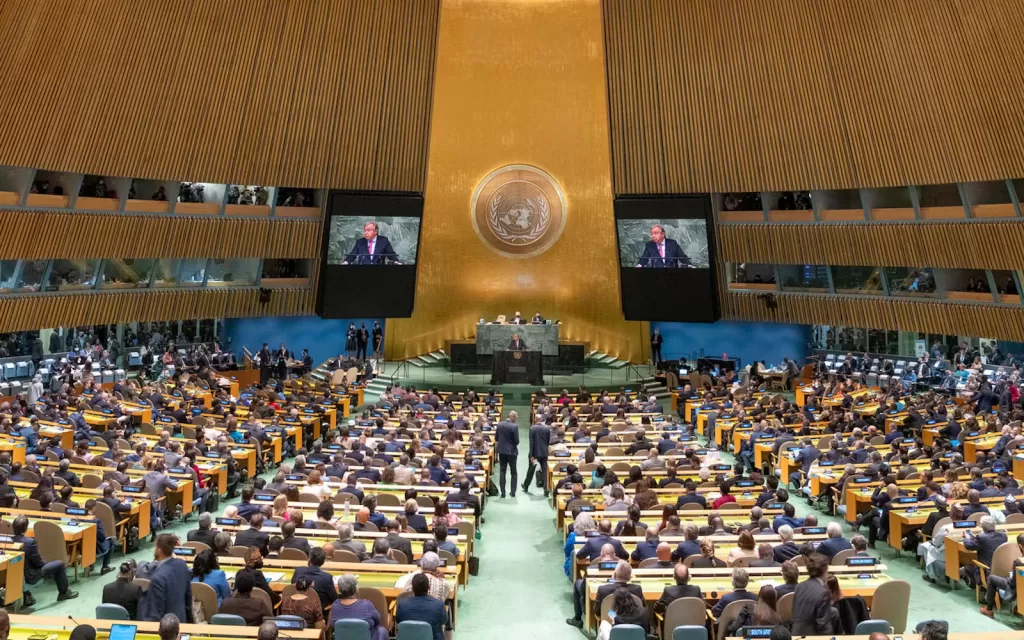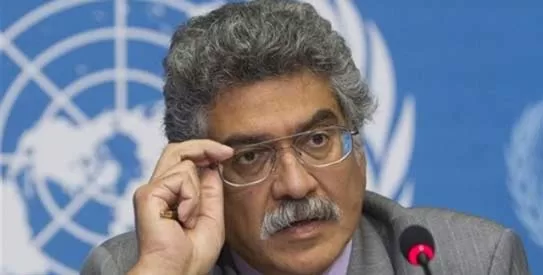Air Cdre (Retd) Khalid Iqbal looks at the inconsistencies in the FMCT that seeks to ban production of fissile material without taking into account existing stocks.
The high level meeting called by the UNSG on 24 September, 2010, concluded without taking any decision on resolving the deadlock being faced by ‘Conference on Disarmament’ (CD), pertaining to ‘Fissile Material Cut off Treaty'(FMCT), also known as ‘Fissban’. However, pressure is incrementally mounting on Pakistan as many delegates in this meeting urged immediate commencement of negotiations on a treaty to ban production of fissile material used as fuel for nuclear weapons. But Pakistan has insisted that it will continue to block such talks, arguing that a ban would put it at a permanent disadvantage to its nuclear rival India.
UN Secretary General Ban Ki Moon urged the international community to end “long inertia” at the Geneva disarmament talks. More than 60 top envoys spoke at the meeting. America, Australia, Britain, France, Mexico, and some other countries suggested that the negotiations for fissile material treaty might have to be shifted elsewhere, perhaps to the UN General Assembly, where it can be adopted by majority vote. However, Russia and China opposed the idea. The French delegate Jacques Audibert said Paris would host a meeting of the five official nuclear powers next year to discuss their obligations stemming from a Revcon 2010 on nuclear non-proliferation.
“Western nations also bear blame for the Geneva standoff. They should not limit the disarmament body’s focus to one treaty, but should also be negotiating pacts to prevent an arms race in outer space, to forswear nuclear attacks on non-nuclear states, and to ban nuclear weapons outright”, said Egypt’s UN Ambassador Maged Abdelaziz. The conference should “agree by consensus on a balanced and comprehensive program of work,” Abdelaziz said on behalf of the 118-nation Non-aligned Movement of mostly developing countries.
The CD is a multilateral forum for disarmament diplomacy that was launched in 1978. CD has clinched important treaties banning biological and chemical weapons as well as underground nuclear tests. But it could not reach a consensus on a substantive work for the past 12 years. Earlier the USA had blocked the proceedings for over eight years as the Bush administration had opposed negotiating a fissile material cut off pact, arguing that it would not be verifiable because the inspection regime would be too intrusive. CD hasn’t produced anything worthwhile since the 1996 Comprehensive Test Ban treaty (CTBT), a pact now on hold because some key nations, including the US, have not yet ratified it.
President Obama reversed that stance last year, and the Geneva conference finally agreed on an agenda. Pakistan allowed the process to move forward but this year it blocked further work. At this time only Pakistan, India, and probably North Korea and Israel, produce fissile material for weapons. The major nuclear powers, after having accumulated thousands of weapons have declared unilateral moratoriums on its production.
India has more fissile material than Pakistan does and a greater capacity to build nuclear warheads. Hence, Pakistan wants a treaty that does not only cut off future production, but also takes into account the current holding of this deadly material. “It presents us with a clear and present danger,” Pakistan’s Geneva negotiator, Zamir Akram, has said of the cut-off proposal. He said earlier this month that Pakistan would continue to hold out, because India has an unfair advantage with bigger fissile material stockpiles and “discriminatory” nuclear cooperation deals with the United States. “Pakistan’s security concerns can be addressed only once we have developed sufficient capacity to ensure our deterrent is credible in the face of growing asymmetry,” He added.

Pakistan started off as an ardent supporter of non-proliferation, however, most of the time this over enthusiasm came back in circles to haunt it. Pakistan enthusiastically participated in the negotiations and drafting of the NPT, yet it had to hold back its accession due to regional security concerns, because India chose not to sign it terming it nuclear apartheid. Once again, when the CTBT was put to vote in UNGA in 1996, Pakistan voted for it and India voted against it. Under similar compulsions Pakistan had to hold back its signatures to the test ban treaty, pending Indian accession. Now America in a quest to transplant a mini super power in Asia, has signed Agreement 123 with India giving freedom of accumulating unaccounted for Plutonium from eight ‘liberated’ reactors and diverting it for weapon production. The quantity is sufficient to produce about 280 nuclear war heads per year. This is in addition to an ongoing programme of 13 nuclear reactors.
Moreover, the Nuclear Suppliers Group’s waiver has allowed India to conclude agreements with eight countries which enables it to increase its fissile material stocks qualitatively and quantitatively and divert most of its indigenous stocks to its weapons programme.
India with a historic record of impeding global non-proliferation efforts stands rewarded; and Pakistan, a proponent of non-proliferation is left high and dry. Fissile material management is a tricky issue, much more than managing the number of warheads and missiles. There are a number of loopholes which could be exploited for circumventing any treaty on the subject.
A viable course of action would be a drastic reduction in nuclear warheads and other military applications of fissile material. Once the demand is reduced, the production would fall. Imposition of a cut off schedule without addressing the demand would only breed and strengthen a class of black marketers. It is in this backdrop that Pakistan took a principled stand at the CD that any agreement on cutting off fissile material production should take into account the existing holding of fissile material by all countries.
The CD had faced a similar deadlock in 1996 when India blocked the adoption of CTBT. This impasse on CTBT was overcome by transmitting the negotiated treaty to UN. Later it was presented as a draft resolution for consideration by a special sitting of the UNGA. Resolution was carried by the house. Pakistan supported the resolution, while India opposed.
The Treaty was opened for signatures on 24 September, 1996. CTBT is still in the doldrums as it has not met the ‘entry into force criteria’. Treaty requires 44 specified “nuclear-capable countries” to ratify it before it can take legal effect. The US, Russia and China have not ratified. Nuclear powers, outside the NPT, India, Pakistan, Israel and North Korea, have not signed it.
The decision to hold this meeting at the UN to overcome Fissban related stalemate was a follow up action to the final document adopted by RevCon 2010, calling upon UNSG to convene a high-level meeting ‘in support of the work of the CD.’ If consensus was evolved, it could have provided a basis for a resolution in the UN’s First Committee (which deals with disarmament and international security), during the 65th General Assembly session, calling for immediate commencement of Fissban negotiations.
When the CTBT was transferred from Geneva to New York to circumvent India’s obstruction, it had been fully negotiated during three years of intense talks. The high-level meeting that the UN secretary general had called in support of work of CD is just the starting point of FMCT discussions, and substantive negotiations are still to begin. In fact CD has yet to start on a programme of work that was adopted in May 2009.
Progress on Fissban has been slowed down due to insistence by Pakistan and other non-aligned nations in the G-21. The G-21 comprises of 35 states, which is more than half the membership of the 65-nation CD; this group also supports Pakistan’s stance that the agreement should also take stock of existing stockpiles of bomb-making fissile material. A similar position was taken by NAM urging the UNSG to put the focus on the entire disarmament agenda, including nuclear disarmament.
Pakistan’s position is neither the first, nor the only example of a country insisting in multilateral arms negotiations that its security interests be accommodated in a binding treaty. Arms control efforts over the decades always had to be flexible enough to address the security concerns of participating states.
G-21 members have also been reiterating that the CD’s work should not become hostage to one issue (FMCT) and should proceed on disarmament matters, so that its work is on equal treatment of all issues, not just those which concern the recognised nuclear powers. Moreover, the envisaged treaty must take into account the security concerns of all states.
Pakistan believes that the treaty, as currently envisaged, will upset the strategic equilibrium in the subcontinent by limiting its deterrent capability, especially when India has been provided the means to burst the ceiling of its nuclear arsenal on an as required basis.
America’s emphasis on early adoption of the controversial FMCT, in isolation, is quite unfortunate. This amounts to treating the symptoms while ignoring the root causes.
Nuclear warheads and, as a corollary, stocking requirement of fissile material is prompted by the threat perception of a nation. Hence, as a prerequisite, there is a need to find fair and just solutions to potential hot spots, and then proceed for non proliferation. There is also a necessity to take into account regional imbalances in the domains of conventional weapons, ballistic missile threat and militarization of outer space, etc.
Accommodating Pakistan’s strategic concerns and those of other developing nations in the CD provides the best and the only way forward if disarmament is to be pursued on the basis of the principle of equal security for all. Where hard calculations of security are involved, nations have to be engaged to forge agreements; they must neither be isolated nor coerced.
Disarmament expert Ray Acheson, of the advocacy group ‘Reaching Critical Will’, told The Associated Press that it might prove “reasonable” to shift to the General Assembly, though unfortunate to exclude Pakistan. The best solution, Acheson argued, would be to leapfrog such intermediate problems by negotiating a treaty outlawing nuclear weapons. UNSG said he would ask his disarmament advisory group to study the issue.
In a closing summary of the views expressed, UNSG said there was “broad agreement on the need to immediately start negotiations on a … treaty banning the production of fissile material”. Unfortunately this amounts to hijacking the spirit of Fissban.
Pakistan needs to adopt a two pronged approach: firstly it should quickly boost its missile material stocks as close to the desired level as possible; secondly, it should try to have concrete diplomatic support from G-21 and NAM countries so that it is not standing alone once it’s time to vote, and strategy should be adopted to expose those countries who are hiding behind Pakistan.




